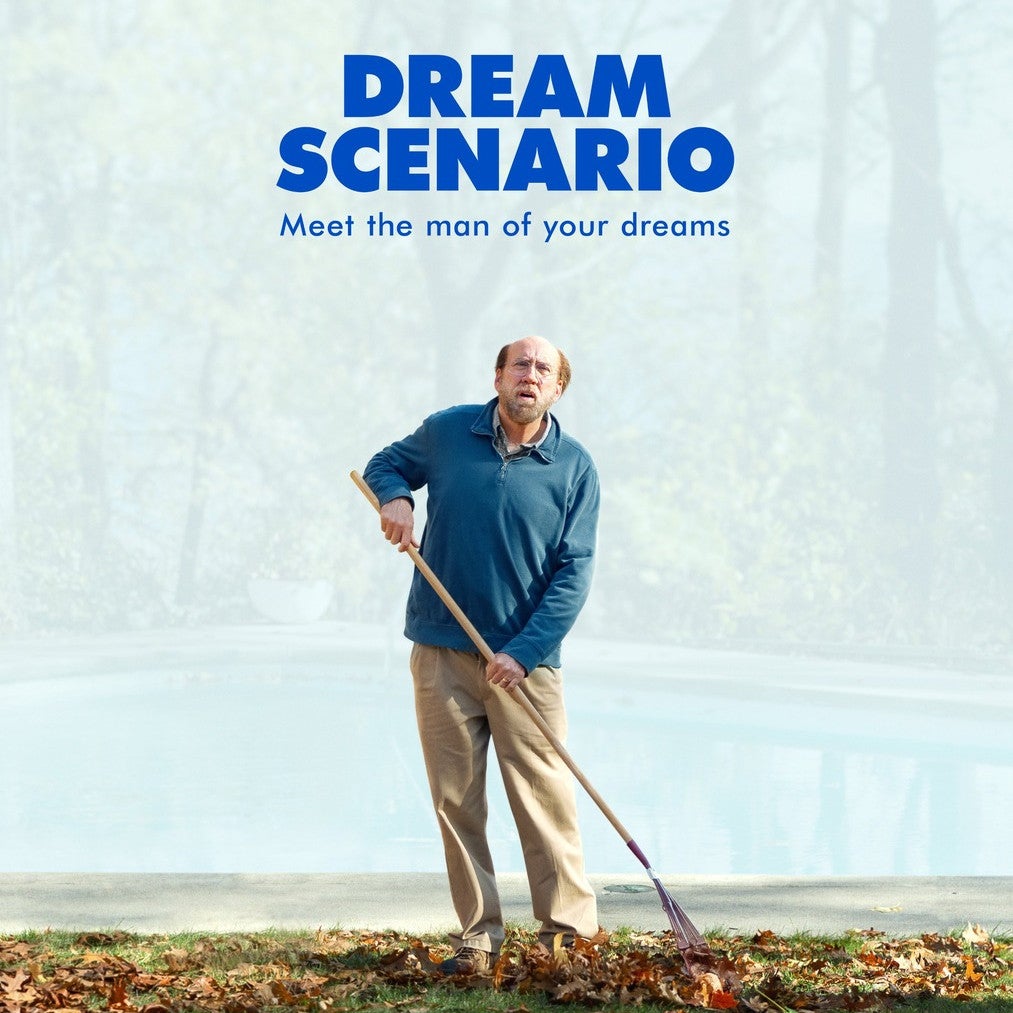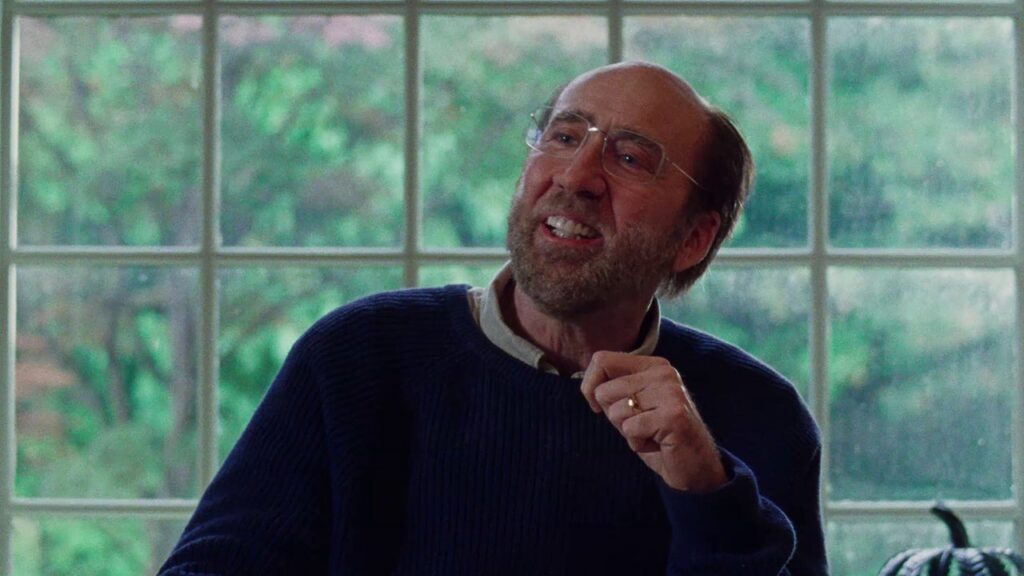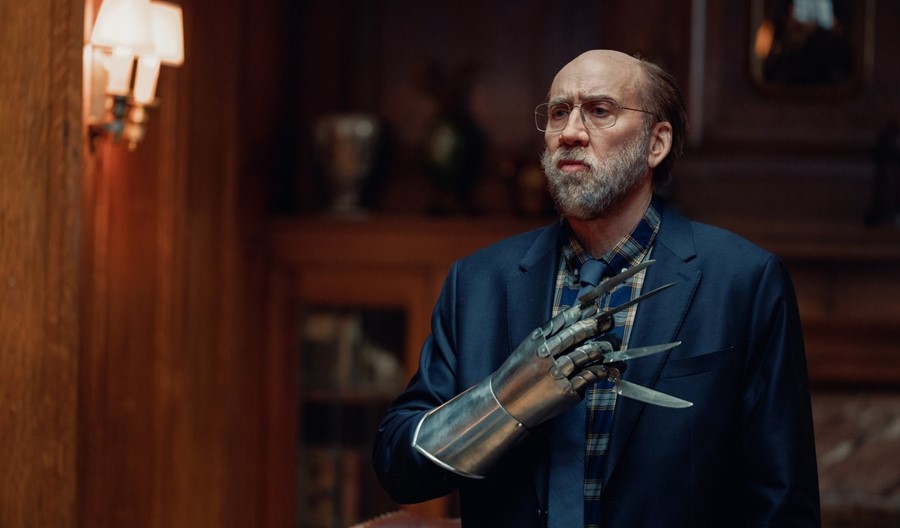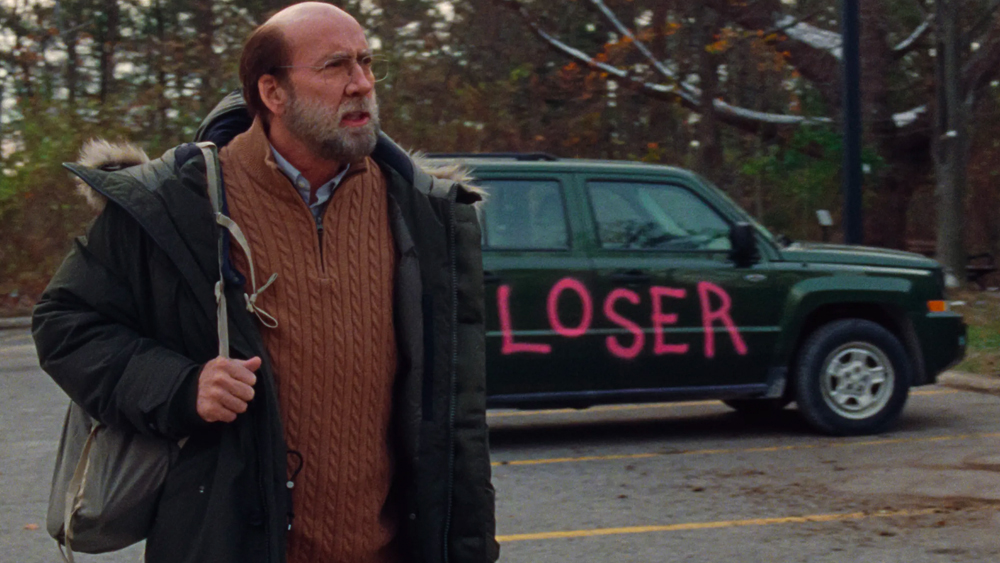
Spoilers.
Dream Scenario is a bizarre dark comedy movie focused on the premise of a man appearing in people’s dreams. Without a doubt, a familiar concept to fans of A Nightmare on Elm Street’s Freddy Krueger, except rather than the mutilated spirit of a deceased child murderer, the subject appearing in people’s dreams here is an almost comically unremarkable, balding middle-aged family man who evolves into a social media sensation virtually overnight for the simple fact that he appears in people’s dreams and does nothing but stand around in them, depicted by none other than Nicolas Cage. And with an outlandish premise like that, there’s no doubt that Nic Cage would feel completely at home in this kind of role, despite the character being one of his more, let’s just say, ‘subdued’ roles.
 Much like Walter White in Season One of Breaking Bad, Paul Matthews (Cage), on the surface, is a painfully average, down-on-his-luck, bumbling father and university professor who is often disrespected by his students and is somewhat awkward in conversation. The opening scene depicts a dream his eldest daughter has of objects falling from the sky, and while she shows concern, Paul simply tells her ‘Its fine’ and does nothing. While this is initially presented as an average dream a daughter would have of her father, suddenly, throughout the movie, Paul is slowly beginning to realize that everyone has been having strange dreams with him in them. The dreams are typically situations where the dreamer is in danger, but he is merely there in the background and doesn’t do anything to help the dreamer. More and more people across the world have similar dreams with him and begin to message him on social media asking, “who are you?” and “why are you in my dream?” and soon he becomes something of a viral celebrity, despite being depicted in the dreams as uninteresting or unhelpful.
Much like Walter White in Season One of Breaking Bad, Paul Matthews (Cage), on the surface, is a painfully average, down-on-his-luck, bumbling father and university professor who is often disrespected by his students and is somewhat awkward in conversation. The opening scene depicts a dream his eldest daughter has of objects falling from the sky, and while she shows concern, Paul simply tells her ‘Its fine’ and does nothing. While this is initially presented as an average dream a daughter would have of her father, suddenly, throughout the movie, Paul is slowly beginning to realize that everyone has been having strange dreams with him in them. The dreams are typically situations where the dreamer is in danger, but he is merely there in the background and doesn’t do anything to help the dreamer. More and more people across the world have similar dreams with him and begin to message him on social media asking, “who are you?” and “why are you in my dream?” and soon he becomes something of a viral celebrity, despite being depicted in the dreams as uninteresting or unhelpful.
Later on, however, Paul would learn that this newfound online dream-fame comes with it’s fair share of problems, including a mentally ill man invading his home and attempting to murder him, telling him that “he has to die”. A viral marketing firm interviewing Paul based solely on his status as “the dream guy” and asking him to appear in Sprite commercials, without accounting for his own personal accomplishments as a biology professor. A glorified Social Media mascot, if you will. And a young accountant (Dylan Gelula) wanting to re-enact her erotic dream fantasy with Paul, resulting in a rather uncomfortable scene that was funny but also made me wince while watching, given the age gap between the two subjects. With Paul’s mental health deteriorating during these events, the dreams that people experience with him start to become more violent and horrific, and the film’s tone alternates between moments of dark comedy to full-blown horror at times, as some of the scenarios depicted in later dreams depict graphic scenarios of violent assault. As a result, the people that once revered him as a celebrity, began to fear and vilify him, going as far as to spray “Loser” on the side of his car. In the public eye, Paul Matthews had truly become a Freddy Krueger of the modern age, albeit unwillingly.
 It’s at this point when the film start’s to become a glaringly blatant allegory for cancel culture, with the worsening dreams jeopardizing Paul and his wife, Janet’s (Julianne Nicholson) career prospects, that same marketing firm contacting him and telling him that he had become popular in controversial Alt-Right circles, and him being told that he is unwelcome in public areas and getting into scraps with random people. All of which culminate in Paul recording a hilariously embarrassing and self-serving apology video reminiscent of the painfully insincere apology videos that are a dime-a-dozen on YouTube from shamed social media figures. It had gotten to a point where a bizarre new scientific breakthrough in dream traveling technology would have to be invented for people to forget the nightmares of Paul. A very strange and jarringly out-of-left field commentary on online advertising that had left me somewhat perplexed, and lead me to think that the filmmakers wanted to add that scene in as an excuse for people to move on from Paul, but was executed in a way that broke my suspension of disbelief.
It’s at this point when the film start’s to become a glaringly blatant allegory for cancel culture, with the worsening dreams jeopardizing Paul and his wife, Janet’s (Julianne Nicholson) career prospects, that same marketing firm contacting him and telling him that he had become popular in controversial Alt-Right circles, and him being told that he is unwelcome in public areas and getting into scraps with random people. All of which culminate in Paul recording a hilariously embarrassing and self-serving apology video reminiscent of the painfully insincere apology videos that are a dime-a-dozen on YouTube from shamed social media figures. It had gotten to a point where a bizarre new scientific breakthrough in dream traveling technology would have to be invented for people to forget the nightmares of Paul. A very strange and jarringly out-of-left field commentary on online advertising that had left me somewhat perplexed, and lead me to think that the filmmakers wanted to add that scene in as an excuse for people to move on from Paul, but was executed in a way that broke my suspension of disbelief.
I ultimately felt that this movie could have explored further into how the concept of the worsening dreams people kept having with Paul correlates with Paul’s own deteriorating mental state. How his guilt and his increasing frustration with his own inadequacy had somehow been the cause of everyone’s dreams of him becoming more vivid and terrifying. It was a concept that was touched upon in earlier scenes but was ultimately scrapped in favour of a less-than subtle social commentary on contemporary cancel culture. A theme of which I’m noticing pop up more and more in modern dark comedy productions. Another example that comes to mind is Bojack Horseman. For what it is, it’s entertaining and hilarious to watch, but relevant though it might be, I feel the increasing trend of cancel culture commentary in movies doesn’t come across as quite as clever or profound as its directors intended it to be. In my view at least, delving more thoroughly into the main character’s psyche being the cause of the nightmares, could have made for a nice allegory into mental health struggles.  As ever, Cage’s performance as this rather pathetic, mentally deteriorating social pariah was incredibly fun to watch, particularly during his half-baked apology scene. His harrowing journey into social pariahdom had a ‘Twilight Zone’-like air about it, where Paul, for the most part, had no control over the situation that he was in, and, as a result, some moments where people would vilify and shun him had felt rather mean-spirited. Ultimately however, this movie exudes a weird, wacky, borderline-fantastical premise with Nicolas Cage feeling well and truly at home in and was fun enough to be worth the price of admission.
As ever, Cage’s performance as this rather pathetic, mentally deteriorating social pariah was incredibly fun to watch, particularly during his half-baked apology scene. His harrowing journey into social pariahdom had a ‘Twilight Zone’-like air about it, where Paul, for the most part, had no control over the situation that he was in, and, as a result, some moments where people would vilify and shun him had felt rather mean-spirited. Ultimately however, this movie exudes a weird, wacky, borderline-fantastical premise with Nicolas Cage feeling well and truly at home in and was fun enough to be worth the price of admission.
